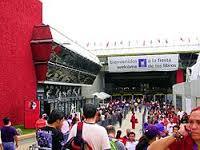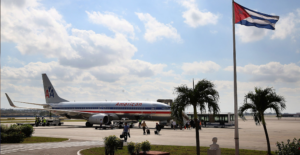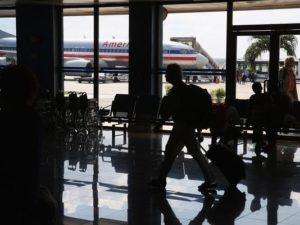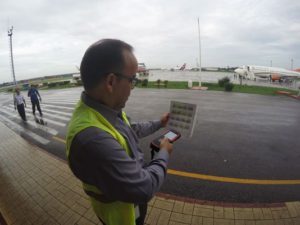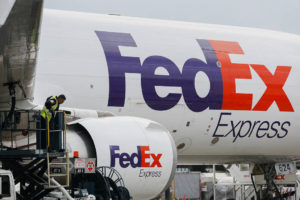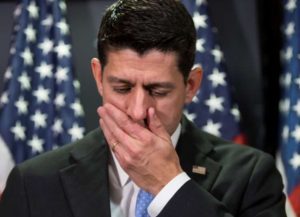Gerard Dion's Blog, page 17
June 28, 2016
2016 The Guadalajara International Book Fair
Dion Publishing Proudly Presents
CUBA UNCHAINED By Author Gerard Dion at The Guadalajara International Book Fair.
The most important publishing gathering in Ibero-America. It is also an amazing cultural festival. Created 29 years ago by the University of Guadalajara, the Fair is aimed at professionals and the general public alike, a characteristic that sets it apart from other book fairs around the globe. With business as one of its main goals, it is also a cultural festival in which literature plays a major role including a program where authors from all continents and languages participate, and a forum for the academic discussion of the major issues of our time.
The most outstanding meeting of the Spanish-language publishing world awaits you in Guadalajara, November 26 to December 4, 2016.
Authors, literary agents, librarians, booksellers and more than 1,932 publishing houses from 43 countries visit us every year. With them, over 750,987 visitors will enjoy the world of books and the very best of the literary and artistic production from Latin America, our 2016 Guest of Honor.
FIL A Cultural Bridge
Founded in 1987 by the University of Guadalajara, the Guadalajara International Book Fair (FIL) is the largest market in the world for Spanish language publications. Year after year publishers, literary agents, promoters of reading, translators, distributors and librarians walk down the aisles of FIL carrying out the commercial and professional trade. Furthermore, over 600.000 people visit during the nine days of FIL, immersing themselves in books and taking advantage of one of the most important cultural festivals in Latin America.
June 21, 2016
Five Reasons To Support S.299 Freedom to Travel to Cuba Act (Flake/Leahy)
Dion Publishing proudly presents
Five Reasons To Support S.299 Freedom to Travel to Cuba Act (Flake/Leahy)
BY CUBA NOW Ric Herrero
1. You Can’t Promote Freedom In Cuba By Denying It To Americans
Cuba is the only country in the world Americans are barred from freely traveling to by their own government. They are not similarly restricted from visiting other communist nations like China or from visiting dangerous and openly anti-American countries like North Korea. Only for Cuba are Americans required to obtain licenses for “purposeful travel” and refrain from tourism.
Restricted travel constitutes an overreach on Americans’ freedom of movement and, contrary to the claims of embargo supporters, has done nothing to curb human rights abuses by the Cuban government. One only needs to look at the previous administration to see how the tightening of trade and travel restrictions did little to promote freedom in Cuba. Indeed, it was current Speaker of the House Paul Ryan who called for opening up travel to Cuba in 2002 as a way to “open closed societies”:
“Mr. Chairman, it has been the American policy from Republican presidents and Democrat presidents that we engage; it has been in the American policy that we engage the Soviet Union, that we engage China, that we, just a few minutes ago, voted to engage Vietnam.
“We should do the same with Cuba. The simple reason is that it has been a bedrock principle of American policy that travel is a device that opens closed societies. American travelers are our best ambassadors. They carry the idea of freedom to people from communist countries. There is no reason to make this exception for Cuba.
“We want Americans to go down and exchange ideas, to show them the taste of freedom, to know what kind of brutal totalitarian regime they are living under. A people cannot rise up and ask for alternatives if they are not acquainted with those alternatives.
“We are simply saying this 42-year practice of turning our backs, of looking inward, of being hypocrites while we go to China and Russia and Vietnam, must be ended.”
Americans support lifting the embargo’s trade and travel restrictions on a strong bipartisan basis. Whether Democrat, Republican, or Independent, Americans understand that over five decades of failed policy need to be brought to an end.
The Senate should pass S.299 Freedom to Travel to Cuba Act and restore the right of all Americans to freely travel.
–
2. U.S. Travel to Cuba Is Strengthening the Cuban People, Not Repression
Contrary to what embargo defenders tell the American people, there is no evidence that increased American travel is bankrolling repression in Cuba. On the contrary, the evidence overwhelming shows that travel by U.S. citizens is contributing to the increased autonomy of the Cuban people.
It is no secret that the Cuban military controls the Island’s tourism sector, but since President Obama began to gradual expand American travel to Cuba seven years ago, we’ve seen a vast expansion of the private sector and pockets of free expression sprout throughout the Island. There are more independent businesses operating in Cuba today than at anytime since Fidel Castro assumed power. At the same time, civil society is more active, vocal and mobile than it has been in decades.
Compare the growth of the past seven years to the period between 2000 and 2008 when codified travel restrictions were rigorously enforced. During that time, the government actually reduced the private sector and its grip over the activities of its people, particularly in their contacts to the few Americans who did visit the Island during that time, was as suffocating as it had ever been.
–
3. The Cuban People Overwhelmingly Support Americans Traveling To Cuba
The embargo’s supporters in Congress do not represent the views of the Cuban people, who are overwhelmingly in favor of normalization. A 2015 poll conducted on the island found not only near-unanimous support for closer ties with the United States (97%) and an end to the embargo (96%), but popularity ratings for an American president that far outstripped both of the Castros. Despite its communist government, pro-American sentiment is increasingly on display in Cuba.
–
4. A Majority Of Cuban-Americans Support A Policy Of Engagement
The idea of Cuba as a political third rail no longer holds water. In fact, a 2014 FIU poll found 69% of Cuban-Americans in South Florida in favor of unrestricted travel for all Americans. Changing views and demographics in the Cuban-American community have also seen support for the embargo steadily erode, with a poll earlier this year finding that 53% supported ending the embargo altogether. Prominent Cuban-American exiles and Republicans like former Commerce Secretary Carlos Gutierrez and Miami businessman Mike Fernandez have come out in support of reengagement, while younger Cuban-Americans have launched new efforts to reconnect with their cultural roots.
–
5. Doing Away With Isolationist Policies Does Away With The Cuban Government’s Scapegoats
Reestablishing relations with Cuba puts the U.S. in a better position to promote human rights on the island. While critics of normalization rightfully point out Cuba’s troubling human rights record, they ignore the inconvenient fact that human rights organizations like Human Rights Watch and Amnesty International support lifting an embargo that has given the Cuban government a scapegoat for its abuses. As Human Rights Watch’s Jose Miguel Vivanco previously wrote:
“For decades, U.S. authorities stubbornly held that the embargo was necessary to promote human rights and democratic change in the island. In fact, though, the embargo did nothing to improve human rights in Cuba. Instead, it imposed indiscriminate hardship on the Cuban population as a whole, and provided the Cuban government with an excuse for its problems and a pretext for its abuses.
“Rather than isolating Cuba, the policy has isolated the United States, enabling the Castro government to garner sympathy abroad while simultaneously alienating Washington’s potential allies.
…
“To promote human rights, judicial independence, free elections, independent unions, and free expression in Cuba, the U.S. government must understand that a multilateral approach is necessary. Involving key democracies in the region in reaching out to Cuba is much more likely to move the Cuban government toward respecting fundamental rights.”
While short-term detentions have increased in recent years, this must be seen in the context of growing activism as a result, in part, of normalization. UNPACU’s José Daniel Ferrer, the head of the largest opposition group on the island, told the New York Times that “Repression has increased, but not because the new policy is weak and paves the way for that, no[.] Repression has increased because every day there’s more activism and courage and the regime fears it will lose control.”
That fear is highly visible in the reaction from hardline Communists within the Cuban government. Fidel Castro’s harshly critical missive published after President Obama’s widely popular visit and heated rhetoric from other members of the Party’s orthodox wing highlight a deep schism between certain government officials seeking to maintain tight control over a changing status quo and the many Cubans who demand faster and more aggressive economic and civil reforms.
–
ALSO WORTH NOTING:
–
Agriculture Exports To Cuba Have Dropped Because Of Restrictive Embargo Policies
U.S. agricultural exports to Cuba have dropped substantially over the past decade thanks to self-defeating embargo laws that cost Americans business with the island. Under current regulations, U.S. exporters are barred from selling agricultural products to Cuba on credit. As a result, we needlessly lose out on a market of 11 million people to countries like Vietnam, Brazil, and France that offer friendlier trade terms.
American farmers around the country have been clear on where they stand about being shut out in Cuba. Congress should pass bipartisan legislation like the Agricultural Export Expansion Act that will do away with harmful red tape and level the playing field for U.S. agricultural exporters.
–
The Increase In Migration to the United States Is Being Driven By Failed Embargo Policies, Not Normalization
The Obama Administration has been careful to stress that they have no plans to change the Cuban Adjustment Act in the wake of normalization. Nonetheless, critics have recklessly peddled rumors to the contrary that the CAA will soon be abolished. This irresponsible scaremongering has helped drive a spike in migration from Cubans worried that they would not only lose their chance to live in the U.S., but remain stuck in Cuba with our economic sanctions still in effect.
Addressing the Cuban migration crisis requires Congress to do more than repeal the Cuban Adjustment Act—which must be done if the Cuban people are to build their own future. It also requires them to lift the economic sanctions against Cuba that contribute to the conditions that drive so many to take dangerous journeys by land and sea.
Russia set to develop manufacturing facilities in Cuba — official
Dion Publishing proudly presents by
Business & Economy
June 21, 9:40 UTC+3 MOSCOW
Russia set to develop manufacturing facilities in Cuba — official Business & Economy
June 21, 9:40 UTC+3 MOSCOW Cuba may become a “window” to Latin America for Russia MOSCOW, June 21. /TASS/. Russia identified setup of production facilities and delivery of products as main areas of cooperation with Cuba, Deputy Industry Minister Georgy Kalamanov told TASS on Tuesday.
“Development of production facilities in the territory of the Republic and supplies of Russian products are goals of our cooperation with Cuba,” Kalamanov said. The official leads the Russian delegation at Cubaindustria-2016 congress and exhibition opened on Monday.
Cuba is “the market where we will work in the nearest future,” Kalamanov said. The parties agreed upon a range of transactions, including supply of Kamaz trucks, he said. “We will see the first lot of Kamaz automobiles in Cuba by the year-end,” the official added.
One more project is aimed at delivery of locomotives and rolling stock to Cuba and at establishment of a joint repair company there. Operation and service maintenance of Russian aircraft delivered to Cuba is also an important aspect of cooperation, the deputy minister said. “The main task now is to service these aircraft in cooperation with our Cuban counterparts,” Kalamanov said. “The parties will agree upon the next list of projects actual within the framework of cooperation between Russia and Cuba in 2016 and 2017” in the coming future, the official said.
Cuba may become a “window” to Latin America for Russia, Kalamanov said. “We hope Cuba will be the hub for supplies of products to Latin America in certain areas,” the official said. “It’s difficult to say now what products and what areas but Cuba has all ground and opportunities to become such a hub,” he added.
U.S. airlines fight for rights to Cuba
Dion Publishing proudly presents
U.S. airlines fight for rights to Cuba
Bart Jansen, USA TODAY 6:07 p.m. EDT March 18, 2016
A charger jet, operated by American Airlines, is parked on the tarmac at Jose Marti International Airport in Havana after flying directly from Miami on Jan. 19, 2015. (Photo: Chip Somodevilla, Getty Images)
The U.S. and Cuban governments agreed that 20 daily flights to Havana and 10 each to nine other cities, as the countries restore diplomatic relations. Government officials hope to choose the winners this summer, with flights beginning as early as fall.
The competition is to serve Havana, where airlines proposed 51 daily flights and a variety of additional flights from one to five times per week.
Most of the daily flights — 38 — would be from Florida, which had two-thirds of the country’s 1.8 million people of Cuban descent in the 2010 Census. But that suggests travelers from elsewhere across the country will probably have to connect. The proposed daily flights from Florida include:
— American: 10 from its Miami hub, along with one each from Charlotte, Dallas and Los Angeles.
— JetBlue: eight from Fort Lauderdale, Orlando and Tampa, along with two from New York’s John F. Kennedy airport and one each from Newark and Boston.
— Southwest Airlines: nine from Fort Lauderdale, Tampa and Orlando.
— Delta Air Lines: two from Miami and one from Orlando, with one each from Atlanta and JFK.
— Silver Airways: two from Fort Lauderdale and Palm Beach, with less-frequent flights from Fort Myers, Key West and Jacksonville.
— Frontier: three from Miami and one from Denver.
— Spirit Airlines: two from Fort Lauderdale.
— Eastern Air Lines: one from Miami.
American said 86% of the charter flights to Cuba originated from Miami last year, so their proposal mirrors that demand. Charters averaged at least 7.3 flights per day from Miami, which reflected a 14% increase from 2014, according to American.
“No airline is better prepared than American to maximize the benefits of scheduled service to Cuba,” according to Howard Kass, American’s vice president for regulatory affairs.
JetBlue, which said it typically cuts fares in half and doubles the number of customers traveling, argued it would be a better choice than American to expand in the Caribbean.
“To the detriment of travelers, American took advantage of its dominance to charge high airfares and offer inferior customer service,” Robert Land, JetBlue’s associate general counsel, said in a filing.
But other airlines sniped at American and JetBlue proposing a combined 25 daily flights, when only 20 are available.
Delta said it was confident government officials would recognize the “negative public interest” of allowing a single airline to hold too many slots. United said airlines seeking a disproportionate share of slots would serve south Florida “to the exclusion of the rest of the country.”
Major airlines lined up scores of supporters for their proposals. Despite the concentration in Florida, airport and elected officials in other cities made a pitch for their flights.
United Airlines proposed the fewest flights among the legacy carriers, with a daily flight from Newark and Saturday-only flights from Newark, Chicago O’Hare, Washington Dulles and Houston Bush airports.
But United submitted 15,000 letters from travelers, workers and vendors supporting the proposal, including from the city of Houston and the agency that oversees Dulles.
Deborah Flint, CEO of Los Angeles World Airports, supported the proposal from Alaska Airlines to offer two daily flights from her city with the fourth-largest Cuban population.
Ultra-low-cost carriers such as Frontier and Spirit said they would offer lower fares than larger rivals.
Among smaller airlines, Silver promoted its regional familiarity with 70 daily flights within Florida, and others to the Bahamas and around the Caribbean. Eastern cited its 90 charter flights each month within Cuba.
Sun Country Airlines proposed two flights per week from Minneapolis. And Dynamic International Airways proposed three flights weekly from JFK, four from O’Hare and four from Los Angeles.
But as government officials gauge which airlines will offer the most benefit, legacy carriers cited their reliability with completed flights and punctuality.
“The history of small, limited scope carriers trying to maximize the public benefits of limited entry markets or slot-constrained airports is poor and littered with failures like Vanguard, People Express and Air Florida,” Alexander Krulic, Delta’s associate general counsel, said in his filing.
U.S. airlines chosen for scheduled flights to Cuba
Dion Publishing proudly presents
U.S. airlines chosen for scheduled flights to Cuba
Bart Jansen, USA TODAY 3:44 p.m. EDT June 10, 2016
Galo Beltran, Cuba country manager for American Airlines, tests a handheld baggage scanner at Havanas Jose Marti International Airport. Beltran is based in Dallas. The Department of Transportation said Friday that six airlines: American, Frontier, JetBlue, Silver Airways, Southwest and Sun Country, have been selected for routes to nine Cuban cities other than Havana. (Photo: Scott Mayerowitz, AP)
WASHINGTON — Six U.S. airlines were approved to begin the first scheduled flights to Cuba in more than 50 years, the Transportation Department announced Friday.
The airlines were approved to fly from five U.S. cities to nine Cuban cities other than Havana. But the department is still considering which airlines will get a combined 20 daily flights to the capital out of nearly 60 proposed flights, which will be announced later this summer.
The carriers approved Friday are American Airlines, Frontier Airlines, JetBlue Airways, Silver Airways, Southwest Airlines and Sun Country Airlines.
The 155 combined weekly flights are expected to begin in the fall and winter, and will depart from Miami, Fort Lauderdale, Philadelphia, Chicago and Minneapolis/St. Paul. While charter flights have been allowed for years, the announcement resumes scheduled airline flights.
The nine destinations in Cuba are Camagüey, Cayo Coco, Cayo Largo, Cienfuegos, Holguín, Manzanillo, Santa Clara, Santiago de Cuba and Varadero. Each city could have received up to 10 U.S. flights per day, but the approvals Friday weren’t contested.
The flights are part of President Obama’s “new journey” with the Cuban people, as part of normalizing relations since relations broke down after the Communist revolution of 1959, Transportation Secretary Anthony Foxx said.
He and Charles Rivkin, assistant secretary of state for economic and business affairs, reached an agreement in February to reestablish flights.
“Today, we are delivering on his promise by re-launching scheduled air service to Cuba after more than half a century,” he said.
Reopening relations with Cuba remains hotly debated in Congress between those supporting Obama’s diplomatic overtures and those arguing that Cuba remains a repressive dictatorship. Travelers to Cuba must still name one of a dozen reasons for the visit other than tourism.
The Transportation Security Administration must still review security at Cuban airports before flights directly to the U.S. are allowed. Sen. Rob Portman, R-Ohio, told TSA Administrator Peter Neffenger at a hearing Tuesday that he was concerned about resuming scheduled flights.
“I want to express my concern right now that we be sure that those airports are fully vetted and they have the proper security screening in place,” he said.
But James Williams, president of the group Engage Cuba, a coalition of businesses and organizations seeking to end the trade embargo with Cuba, said Friday the scheduled flights prove the travel ban “is an outdated relic of the Cold War era.”
“It’s time for Congress to act and end the travel ban,” he said.
Flights approved Friday:
American daily between Miami and Camaguey and Cienfuegos, twice daily between Miami and Holguin, Santa Clara and Varadero. Flights are proposed to begin in 90 days aboard 160-seat 737-800 aircraft and 144-seat Airbus A319 aircraft.
Frontier daily between Chicago O’Hare and Santiago de Cuba beginning Oct. 27, four times weekly on Mondays, Wednesdays, Fridays and Saturdays between Philadelphia and Camaguey beginning Dec. 15; three times weekly on Tuesdays, Thursdays and Sundays between Philadelphia and Santa Clara beginning Dec. 15; and weekly flights on Saturdays between O’Hare and Philadelphia and Varadero starting Jan. 7, 2017. The flights will be on Airbus A320 or A320neo aircraft.
JetBlue daily between Fort Lauderdale and Camaguey, Holguin and Santa Clara beginning Sept. 8 aboard 162-seat A320 aircraft. Flights are expected to begin within 100 days.
Silver from Fort Lauderdale five times weekly other than Mondays and Fridays to Camaguey beginning Sept. 22; three times weekly on Tuesdays, Thursdays and Saturdays to Cayo Coco beginning Nov. 17; weekly on Saturdays to Cayo Largo del Sur beginning Dec. 8; twice weekly on Mondays and Fridays to Cienfuegos beginning Oct. 6; daily to Holguin beginning Oct. 20; three times weekly on Tuesdays, Wednesdays and Fridays to Manzanillo beginning Dec. 15; four times weekly on Mondays, Wednesdays, Fridays and Sundays to Varadero beginning Dec. 1; daily to Santa Clara beginning Sept. 8 and daily to Santiago de Cuba beginning Nov. 3. The airline will use 34-seat Saab 340B Plus turboprop aircraft.
Southwest from Fort Lauderdale twice daily to Varadero and daily to Santa Clara aboard 143-seat 737-700 aircraft. Flights are expected to start within 90 days.
Sun Country from Minneapolis weekly on Saturdays to Varadero and on Sundays to Santa Clara. Flights will be on 126-seat 737-700 and 162-seat 737-800 aircraft.
“The resumption of scheduled air service to Cuba is a historic achievement and we commend Secretary Foxx and his team for making it a reality,” said Steve Johnson, American’s executive vice president of corporate affairs.
Silver is the only airline that will serve all nine cities available, which CEO Sami Tettinen said reaffirms the airline’s reputation for service between Florida, the Bahamas and Cuba.
“This is truly a historic moment and a major win for the large Cuban American population interested in visiting the many destinations in Cuba beyond Havana,” Teittenen said, while also waiting for approval of Havana service.
Robin Hayes, CEO of JetBlue, said the three cities his airline will serve cover diverse parts of “the authentic island,” with Colonial architecture in Camaguey and Holguin, and one of the most respected universities in Santa Clara.
“We have been entrusted to put our mission of inspiring humanity to work,” Hayes said.
Zarir Erani, CEO of Sun Country, said the airline is evaluating its aircraft to determine when to begin flights.
First Cuban product to be sold in U.S.: coffee–sorry no cigar
Dion Publishing proudly presents
USA TODAY Alan Gomez, USA TODAY 3:35 p.m. EDT June 20, 2016
First Cuban product to be sold in U.S.: coffee–sorry no cigar
Cuban workers pile up sacks of coffee at a small warehouse in the Sierra Maestra Mountains, in the eastern province of Santiago de Cuba, on July 26, 2010. (Photo: AFP/Getty Images)
MIAMI — The first iconic Cuban product to reach U.S. store shelves will be coffee. Sorry, no rum or cigars just yet.
Swiss-based Nespresso announced Monday that it will sell long-restricted coffee throughout the U.S. starting this fall, the latest evidence of renewed ties between the United States and Cuba after five decades of estrangement.
The coffee will first be sold as a limited edition, called Cafecito de Cuba, in stores, online and over the phone, with the eventual goal of making it a regular product.
Guillaume Le Cunff, president of Nespresso USA, said it’s good to be the first company to provide Cuban coffee to the U.S. market. He stressed that Nespresso is more interested in developing a long-term arrangement to ensure a steady supply of Cuban coffee for U.S. customers and improved living conditions for Cuba’s farmers.
“We’re not looking at this as a short-term achievement,” Le Cunff said Sunday. “It’s the starting point of a very long-term initiative. We’re very optimistic that we can drive and build this project. Ultimately, we want consumers in the U.S. to experience this incredible coffee and to enjoy it now and for years to come.”
Cuba’s best known products — from coffee to rum to the island’s fabled cigars — have been off limits to U.S. consumers for more than 50 years because of the economic embargo maintained on the communist country. Opportunities opened after December 2014, when President Obama and Cuban President Raúl Castro announced that the Cold War foes would begin normalizing relations.
The Obama administration has since issued new regulations allowing for more trade and travel between the countries. One of the changes allowed U.S. citizens who travel to Cuba to come back with rum and cigars worth no more than $100 combined. Companies are eagerly seeking rights to sell those two products in the United States, but so far U.S. law still prohibits wholesale imports.
The latest changes also included an amended regulation published in April that removed coffee from the list of items barred from being imported from Cuba. Nespresso officials immediately took notice.
The company has already partnered with TechnoServe, a Washington-based non-profit development organization, to assist coffee farmers in Colombia, South Sudan, Kenya and Ethiopia. David Browning, senior vice president for strategic initiatives at TechnoServe, recently visited Cuba to meet with government officials and inspect the small farms where Cuba’s coffee is grown.
Cuban workers pile up sacks of coffee at a small warehouse in the Sierra Maestra Mountains, in the eastern province of Santiago de Cuba, on July 26, 2010. (Photo: AFP/Getty Images)
Much of Cuba’s agricultural land is managed by cooperatives of small, private farmers. They then sell their products to the Cuban government, which either distributes the goods on the island or exports them around the world. Nespresso will begin its Cuba experiment by buying coffee beans from European importers, roasting the beans, packaging the coffee in pods and selling them in the United States.
Browning said both companies examined the new regulations and saw the opening they needed.
“All that was necessary was for the lawyers to make sure they fully understood the U.S. government’s intent,” he said. “Everything was very clear.”
The next phase for Nespresso and TechnoServe will be to help Cuba’s private farmers improve their production processes, from helping them secure new agricultural equipment to fine-tuning their planting and harvesting processes. Browning said such guidance has helped farmers in other countries improve their output, which led to more income for the farmers and improved standards of living.
“We’re really eager to be in listening mode and start to understand the state of industry and how we can be most helpful,” he said.
Until then, the two men were eager for U.S. customers to experience the foreign flavor. Browning described Cuba’s Arabica coffee beans, grown in the fertile lands in eastern Cuba, as having notes of cedar with a light, caramel finish. And Le Cunff said the exotic, forbidden aspect of the coffee is a lure itself.
“Our customers expect us to bring new coffee experiences, and they expect to be surprised,” he said. “We know that with our U.S. customers, there is a high level of curiosity and excitement to have this coffee. So we expect a high level of response.”
June 20, 2016
FedEx Downsizes Cuba Ambitions in Amended Flight Request
Dion Publishing proudly presents THE WALL STREET JOURNAL BUISNESS / LOGISTICS REPORT
Express airline drops Miami-Havana cargo application for Miami-Veradero route using turboprop plane
The company requested a Jan. 15 start date in its amended application, citing “the complexities of setting up operations. Photo: Bloomberg News
By
Mike Esterl
June 17, 2016 3:06 p.m. ET
FedEx Corp. FDX 1.37 % won’t be flying a big cargo plane into Havana anytime soon.
The express delivery giant dropped its bid to operate to Cuba’s capital and is now requesting U.S. regulatory clearance to fly five times a week between Miami and the smaller resort town of Veradero in the province of Matanzas.
In a downsizing of its near-term ambitions, the company also said it would use a Cessna 208 aircraft, which is far smaller than the Boeing 757 it initially proposed for the Miami-Havana route.
Using Varadero as the base for FedEx’s initial operations “would be the more optimal use of its resources under current Cuba marketplace conditions,” it added in the amended application.
A company spokeswoman declined Friday to elaborate on those market conditions or the reason behind the changes. The company reiterated its “strong interest’’ in providing all-cargo transportation service between the countries.
The decision comes amid heated competition for U.S. passenger flight routes to Havana. The Transportation Department last week awarded six U.S. airlines rights to secondary Cuban airports but said it would wait until the summer to apportion flights to the capital after receiving three times more requests than the 20 available daily slots.
FedEx said Friday it plans to provide trucking service from Varadero to Havana, the special development zone in Mariel and Santiago de Cuba. Veradero’s Juan Gualberto Gomez International Airport is roughly 70 miles east of Havana.
The company requested a start date of Jan. 15, 2017 in Thursday’s amended application, citing “the complexities of setting up operations in Cuba with ground and customs clearance capabilities.”
That is later than U.S. passenger airlines plan to arrive on the island nation. American Airlines Group Inc., AAL 1.26 % the largest U.S. airline by traffic, said this week its first Cuban-bound flights will depart Sept. 7 to Cienfuegos and Holguin.
FedEx noted in the amended application that it remains the only all-cargo applicant for U.S.-Cuba scheduled air services. The shift in planned operations, however, suggests tourism, not trade, will take off sooner as the U.S. loosens decades-long travel restrictions to Cuba.
FedEx delivery rival United Parcel Service Inc. UPS 1.03 % confirmed Friday it hasn’t filed an application yet.
“UPS continues to assess the opportunity to provide services to and from Cuba. As trade lanes open and demand for delivery services increases, UPS will take appropriate action to meet the needs of our global customers,” it added in a statement.
June 14, 2016
Watch President Obama’s statement:
Read the President’s full remarks:
Today, as Americans, we grieve the brutal murder — a horrific massacre — of dozens of innocent people. We pray for their families, who are grasping for answers with broken hearts. We stand with the people of Orlando, who have endured a terrible attack on their city. Although it’s still early in the investigation, we know enough to say that this was an act of terror and an act of hate. And as Americans, we are united in grief, in outrage, and in resolve to defend our people.
I just finished a meeting with FBI Director Comey and my homeland security and national security advisors. The FBI is on the scene and leading the investigation, in partnership with local law enforcement. I’ve directed that the full resources of the federal government be made available for this investigation.
We are still learning all the facts. This is an open investigation. We’ve reached no definitive judgment on the precise motivations of the killer. The FBI is appropriately investigating this as an act of terrorism. And I’ve directed that we must spare no effort to determine what — if any — inspiration or association this killer may have had with terrorist groups. What is clear is that he was a person filled with hatred. Over the coming days, we’ll uncover why and how this happened, and we will go wherever the facts lead us.
This morning I spoke with my good friend, Orlando Mayor Buddy Dyer, and I conveyed the condolences of the entire American people. This could have been any one of our communities. So I told Mayor Dyer that whatever help he and the people of Orlando need — they are going to get it. As a country, we will be there for the people of Orlando today, tomorrow and for all the days to come.
We also express our profound gratitude to all the police and first responders who rushed into harm’s way. Their courage and professionalism saved lives, and kept the carnage from being even worse. It’s the kind of sacrifice that our law enforcement professionals make every single day for all of us, and we can never thank them enough.
This is an especially heartbreaking day for all our friends — our fellow Americans — who are lesbian, gay, bisexual or transgender. The shooter targeted a nightclub where people came together to be with friends, to dance and to sing, and to live. The place where they were attacked is more than a nightclub — it is a place of solidarity and empowerment where people have come together to raise awareness, to speak their minds, and to advocate for their civil rights.
So this is a sobering reminder that attacks on any American — regardless of race, ethnicity, religion or sexual orientation — is an attack on all of us and on the fundamental values of equality and dignity that define us as a country. And no act of hate or terror will ever change who we are or the values that make us Americans.
Today marks the most deadly shooting in American history. The shooter was apparently armed with a handgun and a powerful assault rifle. This massacre is therefore a further reminder of how easy it is for someone to get their hands on a weapon that lets them shoot people in a school, or in a house of worship, or a movie theater, or in a nightclub. And we have to decide if that’s the kind of country we want to be. And to actively do nothing is a decision as well.
In the coming hours and days, we’ll learn about the victims of this tragedy. Their names. Their faces. Who they were. The joy that they brought to families and to friends, and the difference that they made in this world. Say a prayer for them and say a prayer for their families — that God give them the strength to bear the unbearable. And that He give us all the strength to be there for them, and the strength and courage to change. We need to demonstrate that we are defined more — as a country — by the way they lived their lives than by the hate of the man who took them from us.
As we go together, we will draw inspiration from heroic and selfless acts — friends who helped friends, took care of each other and saved lives. In the face of hate and violence, we will love one another. We will not give in to fear or turn against each other. Instead, we will stand united, as Americans, to protect our people, and defend our nation, and to take action against those who threaten us.
May God bless the Americans we lost this morning. May He comfort their families. May God continue to watch over this country that we love. Thank you.
The President ordered U.S. flags to be flown at half-staff to honor the victims of the attack in Orlando.
Statement from Press Secretary Josh Earnest:
The President was briefed this morning by Lisa Monaco, Assistant to the President for Homeland Security and Counterterrorism, on the tragic shooting in Orlando, Florida. Our thoughts and prayers are with the families and loved ones of the victims. The President asked to receive regular updates as the FBI, and other federal officials, work with the Orlando Police to gather more information, and directed that the federal government provide any assistance necessary to pursue the investigation and support the community.
Statement from Vice President Joe Biden’s spokesperson:
The Vice President was briefed this morning by his national security advisor on the heinous attack that took place overnight at a nightclub in Orlando, Florida. Vice President Biden offered his prayers for all those killed and injured in the shooting and sends his condolences to all the families and loved ones of the victims. He is closely monitoring the situation and will continue to receive regular updates as we know more.
President Obama on the Tragic Shooting in Orlando June 12, 2016 at 12:23 PM ET by Melanie Garunay
“Frente al odio y la violencia, uno al otro nos amaremos. No vamos a rendirnos al miedo, ni nos volveremos el uno contra el otro. En vez de eso, permaneceremos unidos, como estadounidenses, para proteger a nuestro pueblo y defender nuestra nación, y tomar acción contra aquellos que nos amenazan.”
– El Presidente Obama hablando sobre el trágico tiroteo en Orlando
” in front of the hatred and violence, to each other we love each other. We’re not going to surrender to fear, nor shall we against each other. Instead of that, we will stand United, as Americans, to protect our people and defend our nation, and to take action against those who threaten us.”
– President Obama talking about the tragic shooting in Orlando
Here’s an excerpt of the President’s remarks:
“First of all, our hearts go out to the families of those who have been killed. Our prayers go to those who have been wounded. This is a devastating attack on all Americans. It is one that is particularly painful for the people of Orlando, but I think we all recognize that this could have happened anywhere in this country. And we feel enormous solidarity and grief on behalf of the families that have been affected.
“The fact that it took place at a club frequented by the LGBT community I think is also relevant. We’re still looking at all the motivations of the killer. But it’s a reminder that regardless of race, religion, faith or sexual orientation, we’re all Americans, and we need to be looking after each other and protecting each other at all times in the face of this kind of terrible act.
“With respect to the killer, there’s been a lot of reporting that’s been done. It’s important to emphasize that we’re still at the preliminary stages of the investigation, and there’s a lot more that we have to learn. The one thing that we can say is that this is being treated as a terrorist investigation. It appears that the shooter was inspired by various extremist information that was disseminated over the Internet. All those materials are currently being searched, exploited so we will have a better sense of the pathway that the killer took in making the decision to launch this attack.”
Top Republicans join Obama in condemning Trump’s words
Dion Publishing Proudly Presents Washington Post Sean Sullivan, Mike DeBonis
© J. Scott Applewhite/AP House Speaker Paul D. Ryan (Wis.) denounced Donald Trump for trying to rally support for his anti-Muslim policies, while others castigated Trump for the accusations he has lobbed at Obama.
Top Republicans joined with President Obama and other Democrats Tuesday in sharply condemning Donald Trump’s reaction to the nightclub massacre in Orlando, decrying his anti-Muslim rhetoric and his questioning of Obama’s allegiances as divisive and out of step with America’s values.
Trump — who just a week ago signaled an intent to snap his campaign into a more measured tone for the general election — showed no sign of backing down from his suggestions that Obama was somehow connected to or sympathetic with terrorists, telling the Associated Press that the president “continues to prioritize our enemy” over Americans.
In separate appearances, both Obama and his potential successor, likely Democratic nominee Hillary Clinton, blasted Trump’s proposal to ban foreign Muslims from the United States as dangerous and contrary to the nation’s traditions.
A visibly angry Obama also dismissed Trump’s repeated demands for him to use the term “radical Islam” when speaking about the Orlando shootings and other attacks. “Calling a threat by a different name does not make it go away,” Obama said. “This is a political distraction.”
Clinton described Trump’s response to Orlando as rife with “conspiracy theories” and “pathological self-congratulations.”
The remarkably bipartisan outcry over Trump’s positions — coming at a moment of national mourning after the deadliest mass shooting in U.S. history — set off a new wave of alarm within the GOP over whether the mogul’s promised pivot to the general election would ever materialize. The rift also highlighted the enduring tensions between establishment figures who want to be more inclusive and the bulk of the party, which backs Trump’s proposed Muslim ban and has rallied around him as the presumptive nominee.
Some of Trump’s most ardent backers defended his response to the Orlando attack, saying drastic measures were needed to keep the nation safe. But most Republicans on Capitol Hill tried to distance themselves from Trump’s comments following the terrorist attack on a gay nightclub in Orlando that killed at least 49 people. Senate Majority Leader Mitch McConnell (Ky.) refused to respond to questions about Trump at his weekly news conference.
Speaker Paul D. Ryan (Wis.) denounced Trump for trying to rally support for his anti-Muslim policies, while others castigated Trump for the accusations he has lobbed at Obama.
“I do not think a Muslim ban is in our country’s interest,” Ryan told reporters. “I do not think it is reflective of our principles, not just as a party but as a country.” He called for “a security test, not a religious test” for immigrants.
In a speech Monday, Trump had reiterated his calls for such a ban and expanded its potential reach to include any country with “a history” of terrorism against the United States and its allies. He blamed the Orlando attack — which authorities say was carried out by a man born in America to Afghan parents — in part on a system that “allowed his family to come here.”
“We have to screen applicants to know whether they are affiliated with or supporting radical groups and beliefs,” Trump said in the speech delivered at Saint Anselm College in Manchester, N.H. “We have to control the amount of future immigration in this country, and we have to prevent large pockets of radicalization from forming inside America.”
Senate Foreign Relations Committee Chairman Bob Corker (R-Tenn.), who has praised Trump at times for his willingness to shake up politics and recently met with the mogul, expressed serious unease Tuesday with how Trump responded to a national tragedy.
“Traditionally, it is a time when people rally around our country, and it’s obviously not what’s occurred, and it’s very disappointing,” Corker said.
Sen. Lindsey O. Graham (R-S.C.), a leading national security hawk, said he had “run out of adjectives” for Trump. “I don’t think he has the judgment or the temperament, the experience to deal with what we are facing,” said Graham, who does not currently support the mogul.
Graham, like other Republicans, took issue with Trump’s apparent suggestions in Monday interviews that Obama may identify with the radical Muslim terrorists. Obama “either is not tough, not smart, or he’s got something else in mind,” Trump told Fox News.
Trump expanded on that line of criticism Tuesday, saying in an emailed response to questions from the Associated Press: “President Obama claims to know our enemy, and yet he continues to prioritize our enemy over our allies and, for that matter, the American people.”
Graham said that Trump “seems to be suggesting that the president is one of ‘them.’ I find that highly offensive. I find that whole line of reasoning way off base. My problems with President Obama are his policy choices.”
Sen. Ron Johnson (R-Wis.), who faces a challenging reelection bid, also called Trump’s insinuations about the president “offensive.”
Speaking after meeting with his National Security Council, Obama dismissed Trump’s many calls for him to change the way he talks about terrorism.
“That’s the key, they tell us. We can’t get ISIL unless we call them ‘radical Islamists,’ ” Obama said, referring to the Islamic State militant group. “What exactly would using this label accomplish? What exactly would it change? Would it make ISIL less committed to trying to kill Americans? Would it bring in more allies? Is there a military strategy that is served by this? The answer is: none of the above.”
At a campaign event in Pittsburgh, Clinton excoriated Trump and challenged Republicans to repudiate him. Clinton said Trump — whom she called “Donald” — failed to demonstrate an ability to deliver a “calm, collected and dignified response” to the Orlando attack.
“Instead, yesterday morning, just one day after the massacre, he went on TV and suggested that President Obama is on the side of the terrorists,” Clinton said. “Just think about that. Even in a time of divided politics, this is way beyond anything that should be said by someone running for president.”
Trump has also said Obama should “resign” because of his refusal to utter the words “radical Islamic terrorism.” But one of the mogul’s top backers on Capitol Hill said Trump doesn’t expect that to happen.
“What I think Trump’s saying is: You need to get in the game and start leading, or get out of here,” said Sen. Jeff Sessions (R-Ala.). “That’s just his way of expressing it. And I think people understood that. He doesn’t expect President Obama to resign, but he’s saying you can’t do this job effectively if you don’t understand the nature of the threat we face.”
Sessions said there was no discussion at a 90-minute Senate GOP lunch of Trump specifically; instead it focused on terrorism.
Rep. Adam Kinzinger (R-Ill.), an Air Force major and leading House GOP voice on national security issues, broke sharply with Trump.
“I guess I appreciate Mr. Trump’s fieriness in talking about it, but you don’t do it by alienating the very people that we need, and those are moderate Muslims,” he said. “We have to use the folks that frankly are not radicalized, which is the vast majority of Muslims, to win this war.”
Nationally, 64 percent of Republican voters said in a recent Washington Post-ABC News poll that they approve of Trump’s Muslim ban — as did 45 percent of independents — while 26 percent of Democrats said they approve.
Last week, Trump delivered a subdued speech that celebrated his primary wins and looked ahead to a matchup with Clinton. His campaign told allies that Trump was strategizing for a new phase of the campaign.
But by this week — after a series of fiery rallies in which he called out enemies by name and then his response to Orlando — many Republicans were left scratching their heads.
Lanhee Chen, a respected GOP foreign policy expert who served as policy director on Mitt Romney’s 2012 campaign, called Trump’s Monday speech a “huge wasted opportunity.”
“What he has said overall about foreign policy is very troubling,” said Chen, who said he has many issues with the mogul but does not consider himself part of the “Never Trump” wing of the GOP.
Chen said Trump needs to “start defining what his presidency would look like” in “more than just a few sound bites.” But he added: “I’m not holding my breath.”
David Nakamura and Paul Kane in Washington and Abby Phillip in Pittsburgh contributed to this report.



